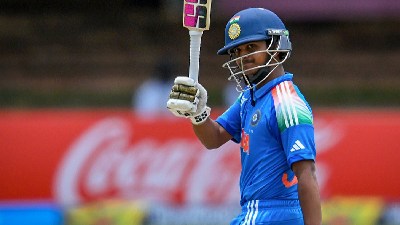UN Reforms
Secretary-General Kofi Annan in his recent report, impressively titled In larger freedom: Towards development, security and human rights for...

Secretary-General Kofi Annan in his recent report, impressively titled In larger freedom: Towards development, security and human rights for all, has made far-reaching recommendations. With a view to strengthening the United Nations, it is recommended that the UN Security Council be expanded to make it more broadly representative of the international community as a whole and the geopolitical realities of today. Another proposal is that the Commission on Human Rights which suffers from declining credibility be replaced by a smaller standing Human Rights Council, as a principal organ of the United Nations or a subsidiary of the General Assembly.
The report embodies a broad vision of the threats to peace and security in the 21st century. These emanate not merely from international war and conflict, but also from terrorism, weapons of mass destruction, organised crime, civil violence, poverty, deadly infectious diseases and environmental degradation. It is rightly emphasised that collective security today depends on accepting that the threats each region of the world perceives as most urgent are in fact equally so for all. This is an echo of poet John Donne8217;s famous lines: 8216;8216;No man is an island, entire of itself; every man is a piece of the continent, a part of the main.8217;8217;
The report calls upon the international community to embrace 8216;8216;the Responsibility to Protect8217;8217;, as a basis for collective action against genocide, ethnic cleansing and crimes against humanity. Another innovative recommendation is that a Democracy Fund be created at the UN to provide assistance to countries seeking to establish or strengthen their democracy. To a cynic, the report may appear Utopian, but remember that progress is the realisation of Utopias.
Immortal Corruption
The CBI this week carried out raids at 144 places across the country against senior government officials suspected of corrupt practices. As a result, CBI claims that immovable assets, cash, jewellery and other valuables worth Rs 11.16 crore have been unearthed. CBI8217;s disclosure aroused strong public indignation. But that will be momentary and ultimately will end not with a bang but with a whimper. Public memory is proverbially short. Therefore, CBI should publish a journal Scam Reporter which gives the names of the persons who have been raided, the dates of the raids, the amounts recovered, the disciplinary or criminal proceedings initiated, the progress of these proceedings and their ultimate outcome. This information should also be published in the print and electronic media. The public has a right to know how these corrupt gentry are dealt with and whether there is any resolute follow-up action.
We have cried hoarse about the cancer of corruption. Yet Lok Pal legislation has not seen the light of day. The Law Commission8217;s recommendation that the properties of the officials found guilty of corruption should be forfeited, has not yet been accepted. This recommendation is salutary because depriving the corrupt of the fruits of their misdeeds will have a greater deterrent effect than fine or imprisonment. The real malaise is the absence of genuine political will to eliminate corruption.
A Unique Pope
The funeral of Pope John Paul II on Friday was attended by thousands including presidents, princes and pilgrims. He was rigid about issues like abortion, contraception, women priests and gay marriages. Nonetheless he was genuinely mourned by millions across the world. A paradox which is explained by the fact that the late Pope had a passion for social justice and for the welfare of the poor and the downtrodden.
Besides, he had the courage of his convictions and took on superpowers whenever there was gross violation of human rights. Of his several writings, some passages from Crossing The Threshold of Hope are most impressive. He mentions how Mahatma Gandhi was disillusioned with the ways in which Christianity was expressed in the political and social life of nations, and questions, 8216;8216;Could a man who fought for the liberation of his great nation from colonial dependence accept Christianity in the same form as it had been imposed on his country by those same colonial powers?8217;8217;
After pointing out the theological distance between Christianity and Islam he states 8216;8216;the religiosity of Muslims deserves respect. It is impossible not to admire, for example, their fidelity to prayer. The image of believers in Allah who, without caring about time or place, fall to their knees and immerse themselves in prayer remains a model for all those who invoke the true God, in particular for those Christians who, having deserted their cathedrals, pray only a little or not at all.8217;8217;
His broad-based concept of globalisation was 8216;8216;to ensure that the winner in this process will be humanity as a whole, not just a wealthy elite that controls science, technology, communication and the planet8217;s resources to the detriment of the vast majority of its people.8217;8217; John Paul II was indeed a unique Pope.
- 01
- 02
- 03
- 04
- 05































